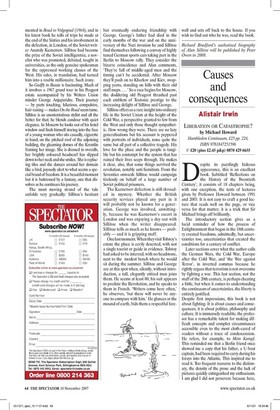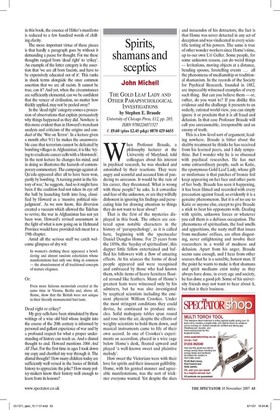Causes and consequences
Alistair Irwin LIBERATION OR CATASTROPHE? by Michael Howard Hambledon Continuum, £25 pp. 224, ISBN 9781847251596 £20 (plus £2.45 p&p) 0870 429 6655 Despite its puzzlingly hideous appearance, this is an excellent book. Subtitled 'Reflections on the History of the Twentieth Century', it consists of 18 chapters being, with one exception, the texts of lectures given by Professor Howard between 1991 and 2003. It is not easy to craft a good lecture that reads well on the page, or vice versa for that matter; it is a trick that Sir Michael brings off brilliantly.
The introductory section gives us a lucid reminder of how the process of Enlightenment that began in the 18th century created freedoms, admittedly, but uncertainties too, uncertainties that created the conditions for a century of conflict.
Later sections cover what the author calls the German Wars, the Cold War, Europe after the Cold War, and 'the War against Terror', in inverted commas because he rightly argues that terrorism is not overcome by fighting a war. This last section, not the stuff of the 20th century, is perhaps cheating a little, but when it comes to understanding the continuum of uncertainties, the liberty is entirely justified.
Despite first impressions, this book is not about fighting. It is about causes and consequences; it is about politics, philosophy and culture. It is immensely readable; the professor has a remarkable talent for making difficult concepts and complex circumstances accessible even to the most cloth-eared of readers without a trace of condescension. He refers, for example, to Mein Kampf. This reminded me that a Berlin friend once showed me a copy that his father, a U-boat captain, had been required to carry during his forays into the Atlantic. This inspired me to read it. Too frequent recourse to the dictionary, the density of the prose and the lack of pictures quickly extinguished my enthusiasm. I am glad I did not persevere because here, in this book, the essence of Hitler's manifesto is reduced to a few hundred words of chilling clarity.
The more important virtue of these pieces is that hardly a paragraph goes by without it demanding a pause for thought. For me these thoughts ranged from 'dead right' to `crikey'. An example of the latter category is the assertion that 'we are all born fascists, and have to be expensively educated out of it'. This ranks in shock terms alongside the once common assertion that we are all racists. It cannot be true, can it? And yet, when the circumstances are sufficiently elemental, can we be confident that the veneer of civilisation, no matter how thickly applied, may not be peeled away?
In the 'dead right' category comes a procession of observations that explain persuasively why things happened as they did. Nowhere is this more evident than in Howard's trenchant analysis and criticism of the origins and conduct of the War on Terror'. In a lecture given a month after 9/11 he makes the unanswerable case that terrorism cannot be defeated by bombing villages in Afghanistan; it is like 'trying to eradicate cancer cells with a blowtorch'. In the next lecture he changes his mind, and in doing so illustrates the hazards of contemporary commentary. The campaign against alQa'eda appeared after all to have been won, partly by bombing. 'A turning point in the history of war,' he suggests. And so it might have been if the coalition had not taken its eye off the ball by launching forth into Iraq, classified by Howard as a 'massive political misjudgment'. As we now know, this diversion created a vacuum which allowed the Taleban to revive; the war in Afghanistan has not yet been won. Howard's revised assessment in the light of what is now going on in Helmand Province would have provided rich meat for a 19th chapter.
Amid all the serious stuff we catch welcome glimpses of dry wit: In women's clothing there appeared a bewildering and almost random eclecticism whose manifestations had only one thing in common — the abandonment of all traditional concepts of mature elegance.
Or: Even more hideous memorials erected at the same time in Vienna, Berlin and, above all, Rome, show that the British were not unique in their literally monumental bad taste.
Dead right or crikey?
My grey cells have been stimulated by these writings of a wise old bird whose insight into the course of the 20th century is informed by personal and gallant experience of war and by a profound respect for what a proper understanding of history can teach us. And a dismal thought to end. Howard mentions 1066 And All That. For the first time in ages I took down my copy and chortled my way through it. The dismal thought? How many children today are sufficiently well versed in the basics of British history to appreciate the joke? How many policy-makers know their history well enough to learn from its lessons?






































































 Previous page
Previous page